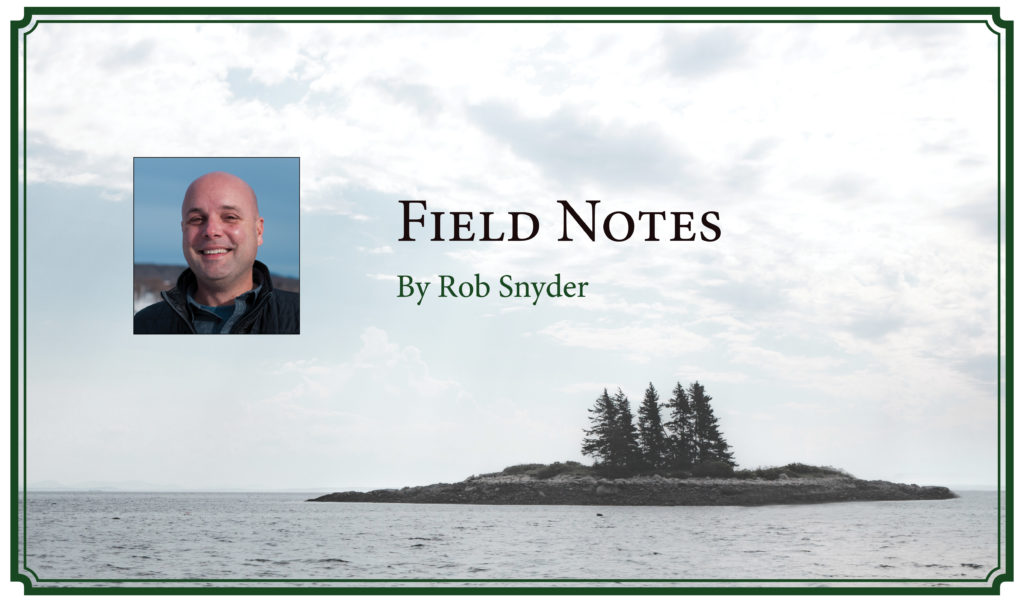By Rob Snyder
When I look back on the past few months, I see them as some of the most formative of my career. My work brought me close to diverse efforts addressing a range of problems, but a theme linking them emerged.
Climate Week in New York City was incredibly challenging. I was invited to sit with leaders I admire from Puerto Rico, the Virgin Islands, the Seychelles, and elsewhere. I learned firsthand about their losses, dislocations, and pain, all driven by the climate crisis. I was once more shaken from the comfort of my home in Maine and brought face to face with the people who are suffering and who demand action. It was a stark reminder that islanders, who contributed at most 1 percent of the world’s human-driven impact on climate, are paying with their lives while the greatest polluters do not act.
I was proud that Gov. Janet Mills spoke at the UN about Maine’s ambitious 2045 carbon neutral goal. Yet at the same time, I was reminded through conversations over the course of a few days that energy goals alone will not build the society we need to outlive this crisis.
In another set of experiences, I was invited to begin exploring the impacts of white privilege, racism, and poverty. This personal and professional work is the beginning of bringing a heightened level of consciousness and thoughtful action to supporting Maine island and coastal leaders as they consider attracting new residents to join their communities and add to their workforce.
The welcome at the Island Teachers Conference was equally important because it took place on the eve of Maine’s first Indigenous Peoples’ Day. The Island Institute opened the conference with a “land acknowledgement,” a formal statement recognizing and respecting indigenous peoples as traditional stewards of this land, and the enduring relationship between them and their traditional territories.
The statement, read by the Institute’s Robin Chernow, gave voice to some hard truths about the displacements and trauma inflicted on indigenous people. Her words evoked sadness and discomfort, and acted as a reminder that we must take care not to act in ways that would recreate the past.
Taken individually, these experiences and the heightened consciousness they create are each important elements of a more just and equitable society. Yet I experienced them separately, and that is often how others experience them. How then do we see the greater whole created by each of these important experiences? How does all of this work add up to a more sustainable and just society in Maine?
At Climate Week, I was motivated to learn from the leadership at Hawaii Green Growth, which is working to achieve the United Nations’ sustainable development goals. Hawaii Green Growth helps local groups and state agencies share their contributions to state and global outcomes, measured against locally set targets aligned with the UN’s goals.
In Maine, we have many organizations working hard to create just and equitable outcomes for all Mainers while working toward environmental goals. We have workforce housing groups, fisheries conservation groups, land trusts, economic development organizations, immigrant rights advocates, support for homeless teens, food pantries, spiritual organizations, LGBTQ support groups, and a whole host of others. My hometown of Rockland is fortunate to be home to many such organizations.
When we develop plans for Maine or for our local organizations, we focus on specific issue areas. For example, housing groups understand and excel at their role assisting new Mainers, the elderly, renters, and first home buyers who wish to make Maine their home. They work on their goals separate from broadband infrastructure groups or transportation focused organizations.
But when we plan by issue, we miss the opportunity to connect the dots and leverage investments across sectors. My hope is that we can overcome these issues as we proceed with the state’s economic development plan and the work of the climate council. I would like to see Maine follow Hawaii and become the U.S.’s second Local 2030 Hub.
The framework for wrapping our planning efforts and outcomes together to generate holistic impacts already exists in the UN Sustainable Development Goals. Looking at the work in Maine through the filter of these goals allows us to advance social, economic, and conservation outcomes as a part of one large effort to create a brighter future for our state. We will be able to celebrate our successes together.
Furthermore, our actions would be linked to global goals shared by island and coastal residents from the states and nations being most heavily impacted by the climate crisis.
Every week I am in contact with people who are devastated by the climate crisis. They remind me that we have a decade, not longer, and all of our actions from here on will be judged for whether we made a difference, or sat by watching as things fall apart.
Rob Snyder is president of the Island Institute, publisher of The Working Waterfront. Follow Rob on Twitter @ProOutsider.





